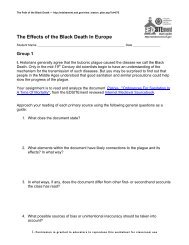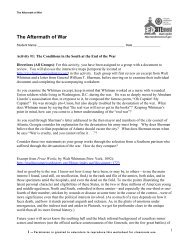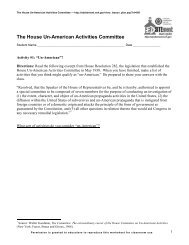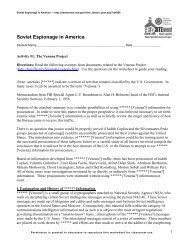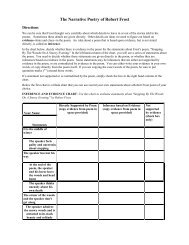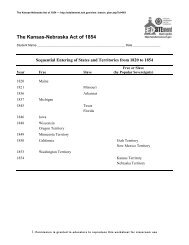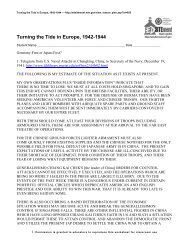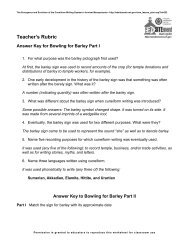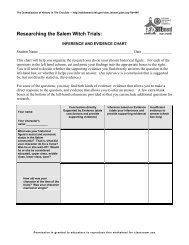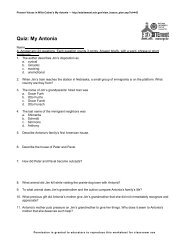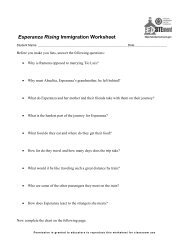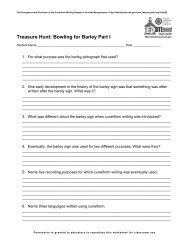Abraham Lincoln, the 1860 Election - EDSITEment
Abraham Lincoln, the 1860 Election - EDSITEment
Abraham Lincoln, the 1860 Election - EDSITEment
You also want an ePaper? Increase the reach of your titles
YUMPU automatically turns print PDFs into web optimized ePapers that Google loves.
<strong>Abraham</strong> <strong>Lincoln</strong>, <strong>the</strong> <strong>1860</strong> <strong>Election</strong>, and <strong>the</strong> Future of American Slavery — http://edsitement.neh.gov/view_lesson_plan.asp?id=662<br />
Does <strong>the</strong> federal government<br />
have any obligation (in <strong>1860</strong>) to<br />
protect slavery in <strong>the</strong> federal<br />
territories?<br />
When can <strong>the</strong> inhabitants of a<br />
federal territory decide to<br />
prohibit or maintain slavery?<br />
If a state prevents <strong>the</strong><br />
enforcement of <strong>the</strong> federal<br />
fugitive slave laws, what has<br />
happened to <strong>the</strong> constitutional<br />
compact between <strong>the</strong> states?<br />
What right do slaveholding<br />
states have if free states<br />
continue to interfere with <strong>the</strong><br />
return of fugitive slaves?<br />
William Lowndes Yancey, “Protest in <strong>the</strong> Charleston Convention,” Excerpt (April 28, <strong>1860</strong>):<br />
Let <strong>the</strong> murmur of <strong>the</strong> hustings be stilled—let <strong>the</strong> voices of individual citizens, no matter how great and<br />
respected in <strong>the</strong>ir appropriate spheres, be hushed, while <strong>the</strong> law, as expounded by <strong>the</strong> constituted<br />
authority of <strong>the</strong> country, emotionless, passionless and just, rolls in its silvery cadence over <strong>the</strong> entire<br />
realm, from <strong>the</strong> Atlantic to <strong>the</strong> Pacific, and from <strong>the</strong> ice-bound regions of <strong>the</strong> North to <strong>the</strong> glittering<br />
waters of <strong>the</strong> Gulf. What says that decision [i.e., <strong>the</strong> 1857 Dred Scott decision of <strong>the</strong> Supreme Court]?<br />
That decision tells you, gentlemen, that <strong>the</strong> Territorial Legislature has no power to interfere with <strong>the</strong><br />
rights of <strong>the</strong> slave-owner in <strong>the</strong> Territory while in a Territorial condition. That decision tells you that this<br />
government is a union of sovereign States; which States are coequal, and in trust for which coequal<br />
States <strong>the</strong> government holds <strong>the</strong> Territories. It tells you that <strong>the</strong> people of those coequal States have a<br />
right to go into <strong>the</strong>se Territories, thus held in trust, with every species of property which is recognized as<br />
property by <strong>the</strong> States in which <strong>the</strong>y live, or by <strong>the</strong> Constitution of <strong>the</strong> United States.<br />
Question<br />
Answer<br />
What does Yancey believe <strong>the</strong><br />
Supreme Court guarantees to<br />
slaveowners who travel to a<br />
federal territory?<br />
Where does Yancey believe<br />
political sovereignty lies in <strong>the</strong><br />
United States, <strong>the</strong> states or <strong>the</strong><br />
union as a whole?<br />
17. Permission is granted to educators to reproduce this worksheet for classroom use



